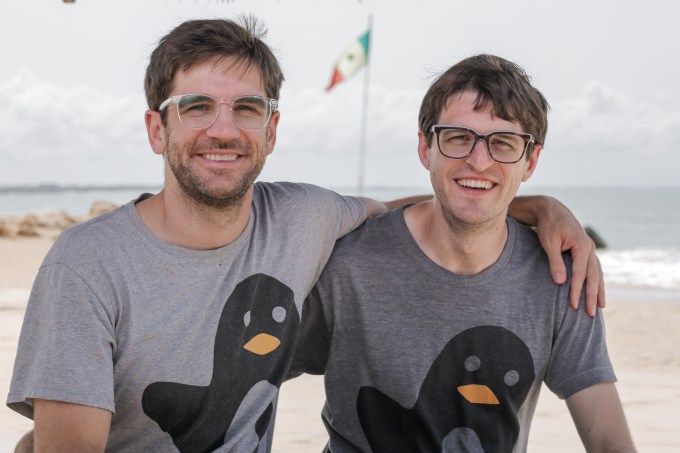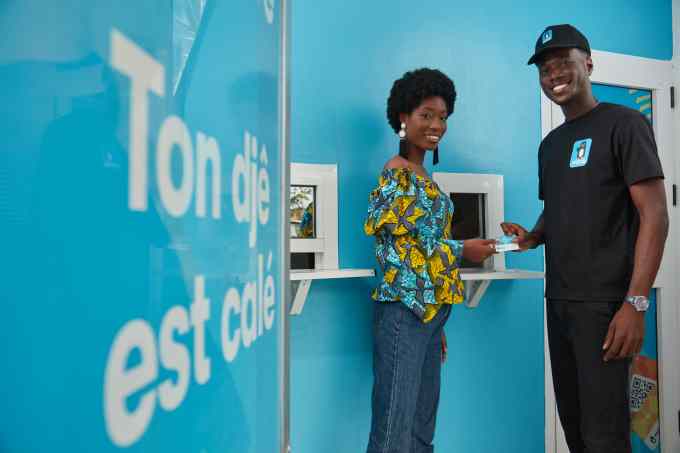Francophone Africa has its first unicorn, and if you’ve been following tech on the continent, you will be very unsurprised to hear that it’s coming from the world of fintech.
Wave, a U.S. and Senegal-based mobile money provider, has raised $200 million in Series A round of funding. The investment is the largest-ever Series A round for the region, and it values Wave at $1.7 billion.
Four big-name backers jointly led the round — Sequoia Heritage, a private investment fund and a subsidiary of Sequoia; Founders Fund; payments upstart Stripe; and Ribbit Capital. Others in the round include existing investor Partech Africa and Sam Altman, the former CEO of Y Combinator and current CEO of OpenAI.
The mobile money market in sub-Saharan Africa is growing exponentially. This past year, up to $500 billion has moved through the accounts of 300 million active mobile money users in the region. But despite being one of the largest alternative financial infrastructures known globally, this represents only a fraction of the overall market.
The International Monetary Fund says that as of 2017, only 43% of adults in sub-Saharan Africa were “banked” by way of a traditional bank or mobile money account. When it comes to growing that proportion, however, mobile money — based on simpler technology and with an easier onboarding process — wins out, and it is set to capture more market share faster than traditional banking in the region. And this has investors, especially foreign ones, excited and looking to get on board.
(Neobanking, based on mobile technology too, falls somewhere in the middle of the two).
From Sendwave to WaveIf you’re wondering why you haven’t heard of Wave, the reason might be because you don’t know it’s a spinoff from Africa-focused remittance provider Sendwave.
Drew Durbin and Lincoln Quirk founded Sendwave in 2014 to offer little or no fee remittances from North America and Europe to select African and Asian countries. The YC-backed company became a WorldRemit subsidiary last year when the global fintech paid up to $500 million in cash and stock for Sendwave.
L-R: Drew Durbin and Lincoln Quirk
But before that, the team stealthily worked on a mobile money product described as having no account fees and “instantly available and accepted everywhere.”
In 2018, the product was piloted as Wave in Senegal but it was still within the Sendwave ecosystem. When WorldRemit acquired Sendwave, Durbin and his team turned their focus to Wave.
“We saw an opportunity to make a bigger impact by trying to build a better, much more affordable mobile money service than the telcos are building throughout much of sub-Saharan Africa,” Durbin told TechCrunch in an interview. “We didn’t see any companies besides the telcos trying to solve that problem.”
Going up against incumbentsTelecom operators and banks have been the early entrants in the mobile money space, not least because they control much of the infrastructure in the process, from having mobile subscribers using handsets on their networks through to building the financial services to manage money and payments at the back end, and everything in between.
Third-party providers, mostly fintechs, have tried to capture some market share from these incumbents. Wave, however, wants to disrupt it.
Durbin tells TechCrunch that unlike M-Pesa, the mobile payment provider led by Safaricom, and other products of telecom operators like Orange and Tigo, Wave is building a mobile money service that is “radically affordable.”
The Dakar-based platform is akin to PayPal (with mobile money accounts, not bank accounts) runs an agent network that uses their cash on hand to service Wave users. According to the company, users can make free deposits and withdrawals and charge a 1% fee whenever they send money.
Durbin says this is 70% cheaper than telecom-led mobile money and whenever there is a transfer problem, refunds are made instantly, unlike with incumbents where users might need to wait for some days.
Wave’s technology also differs from telecom-led mobile money. Whereas the incumbents mostly focus on USSD (although there are provisions to use applications), Wave is solely app-based. For users without a smartphone, Wave also provides a free QR-card to transact with an agent.
By building its own infrastructure full-stack — agent network, agent and consumer applications, QR cards, business collections, and disbursements — Wave has been able to fuel its growth to several million monthly active users and billions of dollars in annual volume.
Image Credits: Wave
The two-year-old startup claims to be the largest mobile money player in Senegal and that over half of the country’s adults are active users. That pegs the number of users between 4 million and 5 million, and Wave wants to replicate this growth in Ivory Coast, the second market it officially expanded to last year.
This sort of growth pressure on telecom operators. That has indeed been the case for the leading telecom operator in both regions, Orange. In June, the telecom operator stopped users in Senegal from purchasing Orange airtime via Wave’s mobile application.
Per this report, Wave argued that Orange was applying anti-competitive tactics by restricting it from selling directly or via an approved wholesaler. Orange said it had made proposals “in line with those offered to its other providers” and that Wave wanted special treatment.
To reach a fair decision, both parties are working with the regulatory body in charge, Regulatory Authority for Telecommunications and Posts (RATP). And if the regulator isn’t capable of settling the issue, BCEAO, the regional bank of Francophone countries, is the next in line to resolve the dispute.
According to Wave’s CEO, the bank’s regulatory approach is one reason why Wave has been able to take on the telecom operators in the first place. But among all the West African countries where mobile money is prevalent, why start with Senegal, an emerging market?
“Senegal is a big enough market that we would have to work really hard to potentially win the market. But also a small enough market that if we were doing well, we could win the market quicker than if we were in a giant country. And so that combination of those two things made it seem like a good place to start,” Durbin remarked.
Following this fundraise, Wave will deepen its presence in Senegal and Ivory Coast and grow its already 800-strong team across product, engineering, and business. In addition, Wave will expand into other markets it feels are regulatory-friendly like Uganda.
“I think there’s a pretty broad array of countries that have strong central banks and clear regulations are open to new players, or even want new players to come in and try to compete with the telcos. And so we have a lot of licenses that are in progress, and we’ll try to prioritize the countries where we’re able to get started sooner over the ones that it takes longer.”
A unicorn after two roundsWhile some reports say Wave had raised $13.8 million prior to this, Durbin declined to comment on the figure when asked. However, he did mention that Partech, the French outfit with an African fund, invested in a seed round alongside other investors like Founders Fund and Stripe.
In addition to Sequoia and Sam Altman, the same crop of investors also participated in this monster Series A round.
In a market that has typically lacked innovation, Partech general partner Tidjane Deme says the investment will help Wave improve its service.
“Since 2018, we’ve supported Wave because we were convinced mobile money is still an unsolved problem in Africa,” he said in a statement. “Wave has great product design, stellar execution, and a strong financial trajectory. We are proud to see it become the first unicorn from Senegal.”
In May, Sequoia Capital invested in Egyptian fintech Telda, its first big deal on the continent. The Wave investment, meanwhile, is coming via subsidiary Sequoia Heritage and is the latter’s first investment in an Africa-focused startup.
In a call with TechCrunch, Altman said that Wave ticked the boxes he considers before an investment — strong founders, an important problem in a large market, working product, and traction.
“I’ve known these founders for a long time, and I think they’re like off the charts good. I’ve been super impressed with their ability to figure out what users want and how to grow,” he said. “I think the company is solving the most important problem around money transfer in Africa and fixing the inefficient agent networks.”
The largest venture rounds for any venture in Africa remain OPay’s recent $400 million fundraise and Jumia’s equivalent in 2016. Both were Series C rounds. The next biggest rounds include Interswitch’s $200 million investment from Visa and Flutterwave’s $170 million Series C.
African fintech OPay valued at $2B in SoftBank Vision Fund 2-led $400M funding
All these companies attained unicorn status following their respective rounds. The same goes for Wave but more spectacularly, considering the company bagged it in a Series A round, it’s transcending the region and is one of the largest A-rounds globally this year.
Wave joins OPay and Flutterwave as the newly minted unicorns in Africa this year — that is, startups valued above $1 billion — and the fourth African unicorn after Interswitch. Other billion-dollar companies include publicly traded Jumia and Egyptian fintech Fawry.
Funding rounds in Africa keep getting bigger and the continent has reached an inflection point. However, some skeptics have questioned the valuations of previous unicorns; Wave wouldn’t be an exception.
The argument would be around why Wave commands such a high valuation when for instance, two prominent telecom operators, Airtel and MTN, are looking to list their mobile money businesses between $2 to $6 billion despite being in the operations for several years across multiple African countries.
Yet like any investor optimistic about a portfolio company, Altman doesn’t believe Wave is overvalued. In fact, he thinks the company is undervalued.
“The opportunity in front of the company is massive. But plenty of times, I’ve gotten it wrong, so you never know. However, I have been fortunate to make a number of great investments and I feel Wave has as good of a shot as you can ask for,” he said. “Africa is going to be the fastest growing and most important market over the next coming decades for many companies. I think people are realizing how big the market opportunity is and how much value is going to be created and we’ll see a lot more things like this happen.”













